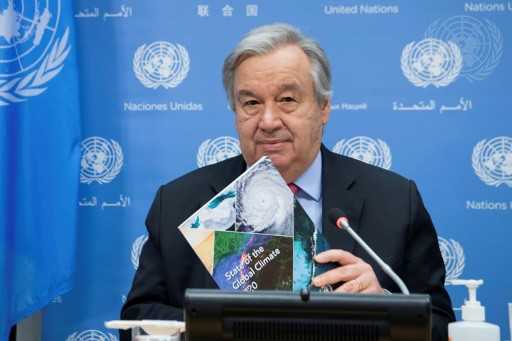World running out of time to tackle climate crisis: U.N.
20 April, 2021

2021 should be the year of action for protecting persons against the "disastrous" effects of climate change, the US said on Monday before an essential U.S.-convened summit.
Time is fast running out to tackle the climate crisis, the U.N. warned, with the COVID-19 pandemic having didn't put the brakes on "relentless" climate change.
The call comes alongside a significant report before U.S. President Joe Biden's climate summit beginning Thursday.
Forty world leaders have already been invited to wait Biden's virtual talks targeted at galvanising efforts by the major economies to tackle the climate crisis.
"We are on the verge of the abyss," U.N. Secretary-General Antonio Guterres told a press conference as he unveiled the State of the Global Climate 2020 report by the U.N.'s World Meteorological Organization (WMO).
"This is a classic pivotal year for humanity's future. Which report shows we have virtually no time to waste, climate disruption is here," Guterres said, as he urged countries to "end our war on nature."
The report described 2020 among the hottest years on record, while greenhouse gas concentrations increased despite the pandemic-related economic slowdown.
This past year featured "extreme weather and climate disruption, fueled by anthropogenic climate change, affecting lives, destroying livelihoods and forcing many millions from their homes," Guterres said.
"This is the year for action. Countries need to commit to net zero emissions by 2050," the U.N. chief said. "They need to act now to safeguard persons against the disastrous effects of climate change."
The 2015 Paris Agreement on climate change demands capping global warming at well below two degrees Celsius above the pre-industrial level, while countries will pursue efforts to limit the increase to at least one 1.5 C.
The WMO believes there is at least a one in five potential for the average global temperature temporarily exceeding the 1.5 C mark by 2024.
The Paris goals will figure prominently at Biden's summit, which young Swedish environmental activist Greta Thunberg sees as an possibility to help "change our mindsets" to get more seriously interested in climate change.
"As long as we aren't actually treating the crisis such as a crisis, of course we will not be in a position to achieve any major changes," Thunberg told a World Health Organization event.
The WMO's 56-page annual report documents indicators of the climate system, including increasing land and ocean temperatures, sea level rise, melting ice and extreme weather.
It also highlights impacts on socio-economic development, migration and displacement and food security.
WMO chief Petteri Taalas said: "All key climate indicators and impact information provided in this report show relentless, continuing climate change, a growing occurrence and intensification of high-impact events and extreme losses and damages affecting people, societies and economies."
Stabilizing global mean temperature at 1.5 to 2 Celsius above pre-industrial levels by the finish of the century "will demand an ambitious reduction of greenhouse gas emissions, which must commence to occur in this decade."
Falling short is not an option, Taalas warned: "If we fail with climate mitigation, we will see dramatic impacts which would last for years and years."
The report said concentrations of the major greenhouse gases -- skin tightening and, methane and nitrous oxide -- continued to increase despite the temporary decrease in emissions in 2020 linked to the Covid-19 pandemic, which shredded economies.
Statistics showed that 2020 was among the three warmest years on record. Days gone by six years, including 2020, have already been the six warmest on record.
Temperatures reached 38 C at Verkhoyansk in Russia on June 20, the best recorded temperature north of the Arctic Circle.
The report said sea-level rise was accelerating, while ocean heat storage and acidification is increasing, diminishing the ocean's capacity to moderate climate change.
During 2020, the unprecedented number of 30 named Atlantic storms resulted in at least 400 fatalities and cost $41 billion in damages.
Extreme heatwaves, extreme droughts and wildfires also resulted in tens of billions of dollars in monetary losses and many deaths.
Some 9.8 million displacements, largely due to hydrometeorological hazards and disasters, were recorded through the first half of 2020.
"This year is pivotal. At the US climate conference, COP26, in November, we have to demonstrate that people are taking and planning bold action on mitigation and adaptation," said Guterres.
However the 71-year-old U.N. chief stressed that reaching bold emissions reduction targets means "radical changes" in financing and also prioritizing efforts to help emerging regions like Africa and South Asia.
Source: japantoday.com
